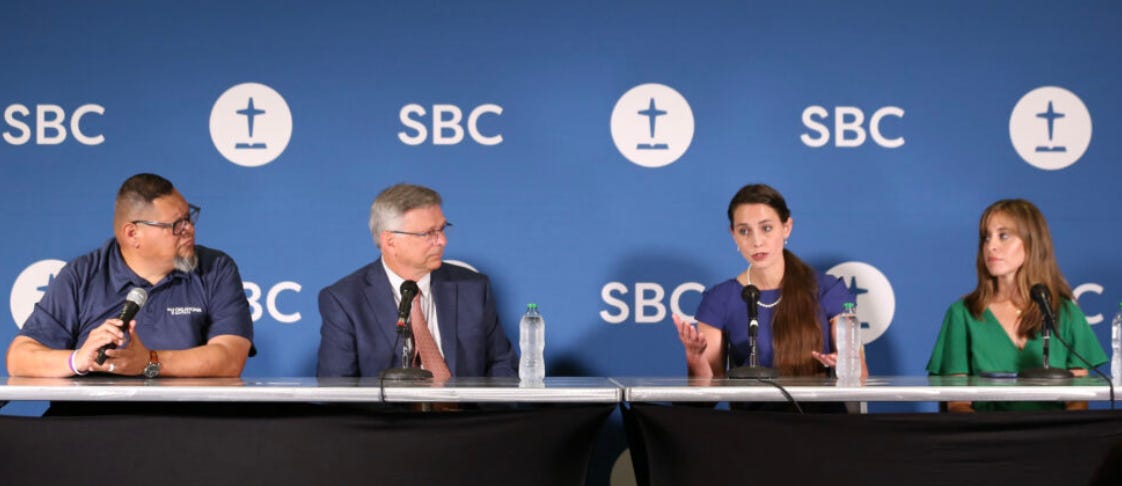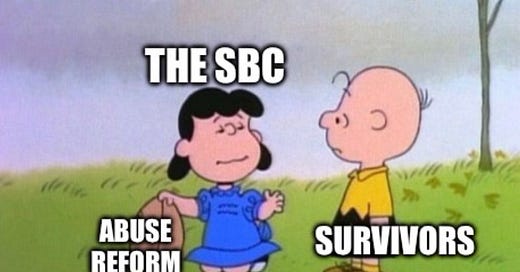When the Southern Baptist Convention meets next week in Dallas, many clergy sex abuse survivors will feel the hurt and betrayal of it.
This will be the first SBC annual meeting since Executive Committee president Jeff Iorg made it clear that, despite the vote of the messengers, SBC leadership has no intention of building a clergy sex abuser database. Last February, in response to a reporter’s question about whether the database was “really a dead option,” Iorg admitted that building a database of clergy sex abusers is “not a focus.”
This small bit of honesty comes after years of Southern Baptist officials trailing out hollow words, impotent task forces, and phony dog-and-pony shows of reform.
It was all a cruel charade – a piece of showmanship that worked to polish the SBC’s image but further betrayed survivors.
It lulled many into believing that the institution cared and that it was trying to do the right thing. But then, like Lucy with the football, SBC officials yanked that hope – again and again and again – leaving survivors in the dirt.
Let’s learn from that.
The SBC’s long track record of duplicity
While we may feel grief-stricken on realizing that the SBC’s promise of reform was illusion, seeing behind the curtain can also be a source of future strength. Truth is the way forward.
Now the SBC’s charade can no longer be sustained.
Oh, they’ll try, of course. But hopefully, many more of us will remember the duplicity of this charade and will not again fall prey to an orchestrated illusion.
For some of us who have been following the SBC’s sordid saga for decades, we’ve seen these rigged performances before.
For example, at the 2008 annual meeting, SBC Executive Committee president Morris Chapman stood before thousands of Southern Baptists and, after never having even allocated a budget for a legitimate study on creation of a clergy abuser database, he preached this:
“We shall not turn a blind eye … We shall protect the weak and vulnerable … We shall provide safe havens … We shall not allow predators to infiltrate our ministries … We shall not allow fear of reprisal to stifle the stories of those who have been abused.”
In the next breath, he declared that the SBC couldn’t possibly keep a database of clergy abusers, and despite the emptiness of his words, the throng of messengers applauded.
As it turned out – something we didn’t learn until fourteen years later – the SBC Executive Committee was in fact already keeping a list of clergy sex abusers, but keeping it secret. (And ironically, it was at that same 2008 annual meeting when Southern Baptists elected Johnny Hunt as SBC president – the pastor who was later named in the Guidepost report as being credibly accused of sexual abuse.)
So, yes, when it comes to dealing with clergy sex abuse, SBC officials have a long track record of duplicity. This is not something new.
Ignore their words & watch what they do
In a 2019 speech outside the SBC’s annual meeting in Birmingham, David Clohessy, longtime former director of the Survivors Network of those Abused by Priests, succinctly provided the wisdom we need. Here’s what he said:
“Ignore church officials. Ignore church promises.”
It’s counter-intuitive, I know. Many of us have been conditioned since childhood to give religious leaders the benefit of the doubt. And we want to believe them – to believe that what they tell us is true. But these are tendencies we must resist so that we can instead look squarely at reality.
And the reality is this: Southern Baptist officials have lost all credibility on anything related to clergy sex abuse.
So, as Clohessy explained, we must learn to ignore what Southern Baptist officials and their allies say, and to place no trust in their words. Their promises and platitudes are hollow, and largely for self-serving ends of public relations.
It’s a “gaslight religion”
Wade Mullen, an expert on the impression management tactics of evangelical organizations, coined a term for this phenomenon of religious leaders who sow confusion about abuse and cloak image management in righteousness: “Gaslight Religion.”
By its very nature, gaslighting disorients us. And it is a mistake of disorientation to view the SBC’s recalcitrance on abuse reform as stemming solely from a few “bad guys” who sought to stymie reforms.
Gaslighting can infect whole systems such that even those with good intentions play a role. As Mullen explains:
“In a gaslit spiritual system, the tactics of the leader are often adopted by the community.”
This is another lesson we can learn from our grief: An oppressive system is often upheld by “good guys.”
In the Southern Baptist Convention, the incessant gaslighting derives not only from the “bad guys,” but also from the “good guys” – those who act as props in the institutional charade of caring and reform.
In the long Southern Baptist saga of recalcitrance, the gaslighting done by “good guys” has been one of the hardest things for me personally to reckon with.
In a sick system, the well-intentioned can be exploited
Whether through naivety, magical thinking, or enmeshment with the institutional faith, some well-intentioned people have functioned as pawns and props in the SBC’s institutional charade. In my view, this includes some of the members and advisers who served on the abuse reform implementation task force – the task force that implemented near-nothing.
That’s a hard reality to stomach because it means that some of the very people who were supposed to be advocating for survivors were instead functioning as useful tools to parrot the SBC’s propaganda and to lend undue credibility to an illusion. It’s massively undercutting of any possibility of trust.

For example, multiple people, including task force members, hyped the “launch” of an empty database as “historic,” even though it held not a single name of any abusive pastor. It appeared they had all received the same coaching from the SBC’s public relations team… and simply went along with it. Then, SBC officials exploited the task force members’ praise for their own positive PR.
One task force member apparently realized the futility of reform efforts and wrote to me privately that “nothing will change.” As appreciative as I was of the candor, I couldn’t help but ponder how much more meaningful it would have been if they had expressed that view publicly.
I ponder, too, how powerful it could be even now if former task force members and advisors would publicly acknowledge their unwitting role in propping up the charade. That would be something we could learn from and something far kinder than phony institutional hype.
By staying silent, even well-intentioned people can be complicit with falsity and oppression.
I’m reminded of Marie Collins, who resigned from a Vatican commission on clergy sex abuse, stating publicly that, in the face of “fine words in public and contrary actions behind closed doors,” she found it impossible to continue.
“Whether your intentions are good or not,” she said, “what really matters is what you do.”
Her resignation was an act of integrity, the kind of integrity we could use among those who purport to care about abuse reform in the SBC.
What now?
The human cost of the SBC’s callous refusal to reckon with clergy sex abuse is unfathomable. On a near daily basis, we read accounts of abuse and coverups, and we see the heart-wrenching devastation wrought by the SBC’s culture of clergy impunity.
For those survivors who are grieving, know that you are not alone, take care of yourselves, and cultivate your skepticism of everything Southern Baptist officials and their allies say on the subject of abuse reform. You have truth on your side, and truth is what holds value across time in this multi-generational effort.
We are building a historical record, and history will surely judge the SBC harshly.
This is not the end of the fight for accountability in the SBC. Even now, there are survivors with lawsuits, and they are up against formidable odds in struggling to expose the rot of this tentacular, multi-billion dollar organization. You can be near-certain that they are dealing with the same sorts of scorched earth tactics that SBC officials used on Duane Rollins. They need and deserve our support, prayers, and well-wishes.
Someday the law will catch up to the SBC. When that day comes, and a court imposes liability on the SBC for abuse in an affiliated church, that will be the beginning of the real reckoning. Belatedly and begrudgingly, the SBC will be forced to behave as a responsible institution.
Meanwhile, with enough survivors, journalists, bloggers, and social media folks constantly reminding the public of the SBC’s continuing recklessness, we can persist in bringing truth to light, ameliorating victims’ pain, encouraging the skepticism of people in the pews, and making kids and congregants safer.
This column was first published by Baptist News Global, an independent news agency that is not affiliated with the Southern Baptist Convention.
For more on the ruses & maneuvers of the Southern Baptist Convention, check out my book, Baptistland: A Memoir of Abuse, Betrayal, and Tranformation. It’s currently on sale!






Dear Christa, I'm angry, saddened, and discouraged. I am not, however, surprised.
I so wish the task force would speak publicly. It would mean so much, even now.